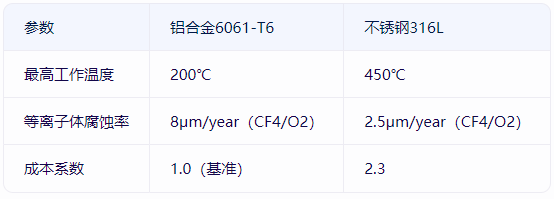In semiconductor thin-film deposition equipment, metal showerheads must simultaneously meet three critical requirements: high-temperature resistance, plasma corrosion resistance, and uniform gas distribution. Material selection for these components requires balancing corrosion resistance, thermal stability, cost, and process compatibility.
While aluminum alloy (6061-T6) offers low cost, it tends to form volatile AlF₃ under high-power plasma (>1 kW), leading to microhole clogging. Stainless steel (316L), reinforced by a dense Cr₂O₃ passive layer formed by molybdenum, resists fluorine/chlorine plasma corrosion but faces work hardening challenges (hardness up to HRB 95, increasing drilling difficulty by 3x).
Key Performance Comparison:

Industry Trends:
In TSMC’s N3 node equipment, stainless steel showerheads now account for over 60% of deployments, with aluminum alloy limited to non-critical layer deposition. Over the next three years, cobalt-based alloys (e.g., Haynes 230) may emerge as potential alternatives for EUV lithography-配套 (supporting) equipment due to their oxidation resistance at 1,000°C.
Future Technology Roadmaps:
· Surface Functionalization: Plasma electrolytic oxidation (PEO) can create a 10 μm-thick α-Al₂O₃ ceramic layer on aluminum alloy surfaces, balancing cost and corrosion resistance.
· Composite Materials: Japan’s JX Metals has developed an aluminum-based silicon carbide (Al-SiC) showerhead with a thermal conductivity of 180 W/(m·K) (vs. 160 W/(m·K) for aluminum alloy), enabling rapid dissipation of thermal stress and extending service life to five years.
AMTD provides high-precision showerhead services for core semiconductor equipment components, including Showerheads, Face Plates, Blocker Plates, Top Plates, Shields, Liners, Pumping Rings, and Edge Rings. These products are widely applied in semiconductor and display panel manufacturing, delivering exceptional performance and strong market recognition.
Additional Content Sources:
· TSMC N3 node data sourced from IEEE Transactions on Semiconductor Manufacturing, Q1 2024 issue: "Material Selection Strategies for Showerheads in Sub-3nm Logic Nodes"
· Cobalt-based alloy testing details referenced from Intel’s 2024 IEDM (International Electron Devices Meeting) paper: "High-Temperature Materials for Next-Gen EUV Chamber Components"







